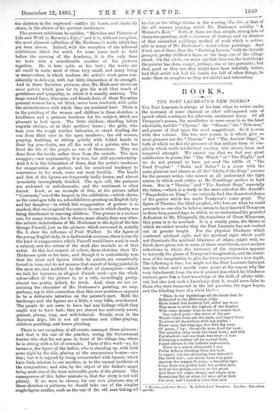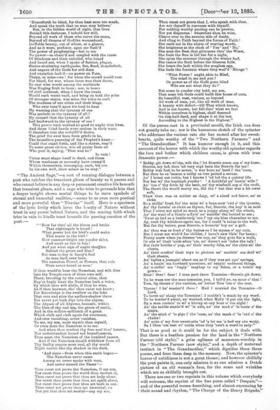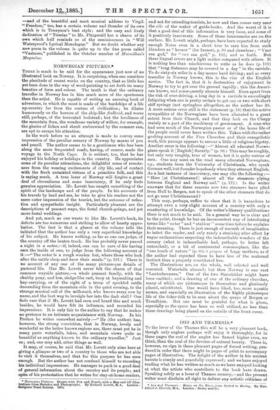Boors.
THE POET LAUREATE'S NEW POEMS.•
THE Poet Laureate is always at his best when he writes under the restraint of some classical or other self-imposed rule of speech which condenses his otherwise exuberant fancy. Of all Tennyson's poems, the novellettes in verse seem to us the least admirable, and the " Ulysses," the " CEuone," the " Tithonns," and poems of that type, the most magnificent. So it is even with this volume. The two new poems in it which give us most pleasure are the "Tiresias " and " The Ancient Sage," in both of which we feel the pressure of that antique form of sim-
plicity which welds intellectual emotion into severe, keen, and tempered strength. We cannot say that we find any great satisfaction in poems like "The Wreck" or "The Flight," and we do not pretend to have yet read the riddle of "The Dead Prophet." "Balin and Balan " is a poem with the same glamour and charm as all the "Idylls of the King " possess for the present writer, who cannot at all understand the light esteem in which such critics as Mr. Courthope profess to hold them. But in "Tiresias " and " The Ancient Sage," especially the latter,—which is a study in the same school as Mr. Arnold's " Empedocles on Etna,"—we certainly find the clearest evidence of the genius which has made Tennyson's name great. The figure of Tiresias, the blind prophet, who foresaw what he could persuade no one else to believe, seems to have haunted Tennyson in those long passed days to which, as we understand his graceful dedication to Mr. Fitzgerald, the translator of Omar Khayonm, this poem is to be ascribed. It is a stately poem, the theme of which we rather wonder that the Poet Laureate has not worked out at greater length. For the physical blindness which conferred spiritual sight, and the spiritual sight which could not illuminate the spiritual blindness of others, might well, we think, have given rise to more of those semi-Greek, semi-modern reflections in which the terseness of the expression appears to intensify the gleam of Tennyson's imagination, and the weird- ness of his imagination to give the terse expression a new depth. The following is fine ; but might not the Poet Laureate have put into the blind seer's mouth some guess at the reason why the very detachment from the world around him which his blindness secured, gave him a finer knowledge of the drift of affairs with-
out, but also just such a knowledge that it would seem false to those who were immersed in the hot passions, the eager hopes, and the blinding fears of a vivid life?— "Then, in my wanderings all the lands that lie Subjected to the Heliooniau ridge Have heard this footstep fall, altho' my wont Was more to scale the highest of the heights With some strange hope to see the nearer God.
One naked peak—the sister of the sun Would climb from out the dark, and linger there To silver all the valleys with her shafts— There once, but long ago, five fold thy term Of years, I lay ; themiuds were dead for heat ; The noonday crag made the hand burn ; and sick For shadow—not one bush was near—I rose Following a torrent till its myriad falls Found silence in the hollows underneath.
There in a secret olive-glade I saw Pallas Athena climbing from the bath In anger; yet one glittering foot disturb'd The lucid well; one snowy knee was prest Against the margin flowers ; a dreadful light Came from her golden hair, her golden helm And all her golden armour on the grass, And from her virgin breast, and virgin eyes Remaining Sit on mine, till mine grew dark For ever, and I heard a voice that said • Tiresias, and other Poelr.s. By Alfred, Lord Tennyson. London: Mao.nillan. and Co.
'Henceforth be blind, for thou hut seen too much, And speak the truth that no man may believe.'
Son, in the hidden world of sight, that lives Behind this darkness, I behold her still, Beyond all work of those who carve the atone, Beyond all dreams of Godlike womanhood, Ineffable beauty, out of whom, at a glance, And as it were, perforce, upon me flash'd The power of prophesying—bat to me
No power—so ohain'd and coupled with the curse•
Of blindness and their unbelief, who heard And heard not, when I spake of famine, plague, Shrine-shattering earthquke, fire, flood, thunderbolt, And angers of the Gode for evil done And expiation lack'd—no power on Fate, Theirs, or mine own ! for when the crowd would roar For blood, for war, whose issue was their doom, To cast wise words among the multitude Was flinging fruit to lions ; nor, in hours Of civil outbreak, when I knew the twain Would each waste each, and bring on both the yoke Of stronger states, was mine the voice to curb The madness of our cities and their kings.
Who ever tarn'd upon his heel to hear My warning that the tyranny of one Was prelude to the tyranny of all ?
My counsel that the tyranny of all Led backward to the tyranny of one ?
This power bath worked no. good to aught that lives, And these blind hands were useless in their wars.
O therefore that the nnfnlfill'd desire, The grief for ever born from griefs to be,
The boundless yearning of the Prophet's heart— Could that. stand forth, and like a statue, rear'd
To some great citizen, win all praise from all Who past it, saying, That was he !' In vain !
Virtue must shape itself in deed, and those Whom weakness or necessity have cramp'd. Within themselves, immerging, each, big urn. In his own well, draw solace as he may."
"The Ancient Sage,"—a sort of running dialogue between a poet who catches the transient gleam of beauty as it passes and who cannot believe in any deep or permanent creative life beneath that transient gleam, and a sage who tries to persuade him that a deeper insight shows. mortal things to be mere symbols of eternal and immortal realities,—seems to us even more poetical and more powerful than " Tiresias " itself. Here is a specimen of the lyric levity which loves the beauty of Nature without trust in any power behind Nature, and the musing faith which tries in vain to kindle trust beneath the passing emotion of the
poet:— " ' How far thro' all the bloom and brake
That nightingale is heard !
What power but the bird's could make.
This music in the bird ?
How summer-bright are yonder skies, And earth as fair in hue !
And yet what sign of aught thatllies Behind the green and blue?
But man to-day is fancy's fool As man bath ever been.
The nameless Powei; or Powers, that rule Were never heard or seen.
If thou would'et hear the Nameless, and wilt dive Into the Temple-cave of thine own self, There, brooding by the central altar, thou May'st haply learn the Nameless hath a voice, By which thou wilt abide, if thou be wise, As if thou knewest, tho' thou caust not know; For Knowledge is the swallow on the lake That sees and stirs the sarface-shadow there But never yet hath.dipt into.the abysm,
The Abysm of all Abysme, beneath, within.
The blue of sky and sea, the.green of earth,.,
And, in the million-millionth of a grain Which cleft and cleft again for evermore, And ever vanishing, never vanishes, .
To me, my son, more mystic than myself,
Or even than the Nameless is to me.
And when thou sendest thy free soul thro' Ileum Nor understandest-bound nor boundlessness, Thou seest the Nameless of the hundred names.
And if the Nameless should withdraw from all Thy frailty counts most real, all thy world Might vanish like thy shadow in the dark.
'And since—from when this earth began— The Nameless never came Among no, never spake with man,
And.never named the Name'—
Thou canst not prove the Nameless, 0 my son, Nor canst thou prove the world thou movest in, Thou carat not prove that thou art body alone, Nor canst thou prove that thou art spirit alone, Nor mast thou prove that thou art both in one : Thou caust not prove thou art immortal, no Nor yet that thou art mortal—nay my son, Thou canst not prove that I, who speak with thee, Am not thyself in converse with thyself, For nothing worthy proving can be proven, Nor yet disproven : wherefore thou be wise, Cleave ever to the sunnier side of doubt, And cling to Faith beyond the forms of Faith ! She reels not in the storm of warring words, She brightens at the clash of ' Yes' and ' No,' She sees the Best that glimmers thro' the Worst, She feels the Sun is hid but for a night, She spies the summer through the winter bpd, She tastes the fruit before the blossom falls, She hears the lark within the songless egg, She finds the fountain where they weird' Mirage".
' What Power ? aught akin to Mind, The mind in. me and yon ?
Or.power as of the Gods gone blind Who see not what they do r
But some in yonder city hold, my son, That none but Gods could build this house of ours, So beautiful, vast, various, so beyond All work of man, yet, like all work of man, A beauty with defect—till That which knows, And is not known, bat felt thro' what we feel Within ourselves is highest, shall descend On this, half-deed, and shape it at the last. According. to the Highest in the Highest."
Of the poeroacast in a provincial mould, the Irish one does not greatly take us ; nor is the humorous sketch of the spinster who addresses the various cats she has named after her sweet- hearts,, quite worthy of the " Two Northern Farmers " and "The Grandmother." It has humour enough in it, and this account of the horror with which the worthy old spinster regards the fuss and bother which_ children cause, is given- with true dramatic power :—
" Robby, git down wi'tha, wilt the.? let Steevie coom oop o' my knee. Steevie, my lad, thou 'ed very nigh been the Steevie fur me! Bobby war fort to be sewer, e war burn an' bred i' the 'oase, Bat thou be es 'ansom a tabby as iver patted a mouse.
An' I beint net vaftin, but I knows I 'ed led the a quieter life Nor her.wr the hepitaph yonder ! ' A fahithful an' loovin' wife !' An' cos o' thy farm by the beck, an' thy windmill oop o' the croft, Tha thowt the would marry ma, did the ? but that war a bit ower soft, Thaw thou was es saber as daily, wi' a nioed red faace, an' as clean
Es a BUR& fresh fro'- the mint wi' a bran-new 'end o' the Queean, An' thy farmin' es clean as thysen, fur, Steevie, tha kep' it sa neat That I niver not spied an much as a poppy along wi' the wheat, An' the-wool-of a thistle a-flyin' an' seeadin' tha baited to see ; 'Twar as bad as a battle-twig 'ere i' my can blue chaumber to me. Ay, roob thy whiskers agefin ma, fur I could 'a taken to tha well, But fur thy bairns, poor Steevie, a boancin' boy an' a gell.
An' than was as fond o' thy bairnees I be mysen o' my cats, But I niver not wish'd far childer,.I hevn't naw likin' far brats; Pretty anew when ya dresses 'em oop, an' they goes far a walk, Or sits wi' their 'ands afoor 'em, an' doesn't not inder the talk ! But their bottles o' pap, an' their mucky bibs, an' the data tin' the clouts, An' their mashin' their toys to pieaces an' maakin' ma deaf wi' their shouts, An' hallus.a-joompin' about ma as if they was set npo' springs, An' a basin' ma hawkard questions, an' sallyin' ondecent things, An' a-callin' ma ' hugly' mayhap to my fatice, or a tearin' my
gown—
Dear ! dear! dear ! I man part them Tommies—Steevie git down.
Ye be wins nor the men-tommies, you. I tell'd ye, na moor o' that ! Tom, lig theere o' the cushion, an' bother Tom 'ere o' the mat.
Theere ! I ha' master'd them ! Hed I married the Tommies—O Lord, To loove.an' oleay the Tommias ! I couldn't 'a stank,by.my word. To be horder'd -about, an' watiked, when Molly 'd put out the light, By a man coomin' in wi' a hiccup at ony hour o' the night ! An' the taable ataain'd wi"is sale, an' the- mad o"is boots o' the stairs, An' the.stink o' 'is pipe i' the 'ones, an the mark o' 'is 'ead o' the chairs!
An' wan o' my four sweet-arts 'ad 'a let me 'a bed my oan waxy, Sa I likes 'em best wi tattle when they 'evn't a ward- to may."
That is as good as it could be for the subject it deals with. But there is a heathen passion for the land in the "Northern Farmer (old style)," a grim ugliness of mammon-worship in the " Northern Farmer (new style)," and a depth of maternal instinct in " The: Grandmothers" which dignifies these three poems, and fuces them deep in the memory. Now the spinster's horror of untidiness. is not a great theme ; and however skilfully the poet paints it, one only admires it as one admires a Dutch picture of an old woman's face, for the. scars and wrinkles
which are so skilfully brought out.
There are one or two reprints in this volume which everybody will welcome, the reprint of the fine poem called " Despair,"— and of the powerful verses describing, and almost expressing by their Iceland and rhythm, " The Charge of the Heavy Brigade," —and of the beautiful and most musical address to Virgil. "Freedom," too, has a certain volume and thunder of its own which is in Tennyson's best style ; and the easy and lively dedication of " Tiresias " to Mr. Fitzgerald has a charm of its own which half reminds us of the reminiscences in " Will Waterproofs Lyrical Monologue." But we doubt whether any new poem in the volume is quite up to the fine poem called "Vastness," published in the October number of Macmillan's Magazine.




















































 Previous page
Previous page